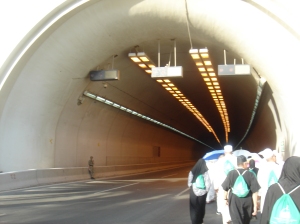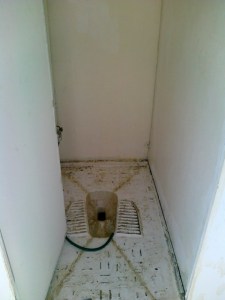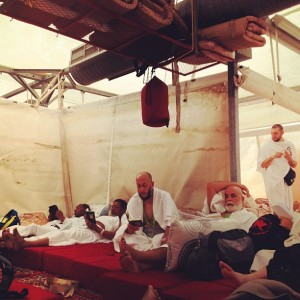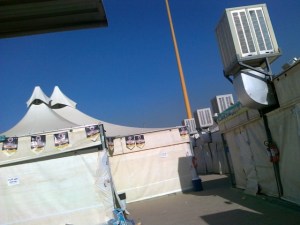Friday, 4th November, 2011. The day that my wife and I embarked on our Hajj. We’d made all our preparations, entered into ihraam, and we were about to make our way up to our camp on Mina – where hujjaaj spend most of the five days of Hajj. It had been a long wait – from the point where the call had come to me a year earlier, then the months of preparation, then departing for the journey, and finally the five weeks in Saudi leading up to this point. And now it was here.
Tent City welcomes you
We arrived late to meet our group – with everyone already waiting for the latecomers, and the group having collectively pronounced their niyah for Hajj. It wasn’t the ideal way to start, but we hurriedly made our niyah, and then set off with the group – taking that 20 minute walk up the hill, through the tunnel, and onto the vast plain of Mina, all the while reciting the talbiyyah:
Labbayk Allahumma labbayk (Here I am at Your service, O Lord, here I am!)
Labbayka la sharika laka labbayk ( Here I am at Your service! You have no partners, here I am!)
Innal-hamda, wan-ni`mata, laka wal-mulk (Yours alone is all praise and all bounty, and Yours alone is sovereignty.)
La sharika lak (You have no partners.)
My feelings were similar to that of the first time I was in ihraam – before our first umrah, yet this time the magnitude of the event was far greater. There was little space for thoughts of the outside world or distractions. Everything needed to be focussed on what awaited in the coming days – especially Arafah the next day.
On Mina, our group leaders took us to our camp, where men and women were separated into male and female tents. Good companionship is important on this journey (and in life, generally) – so I was fortunate to get a spot next to one of my wife’s relatives, who wasn’t the kind to waste time with gossip or anything negative.
As expected, there wasn’t much in the way of comfort. We each got one smallish mattress, one pillow, and one blanket. We were in a ‘special services’ camp – meaning that we were close to the Jamaraat, had our meals provided for us, and had 24 hour access to snacks. Others on Mina weren’t so fortunate, with the worst off being those who had to pitch small tents on the dirty pavements beside the roads. (I’ve been told those were illegal hujjaaj – i.e. they don’t have permits to perform Hajj.)
The toilet situation wasn’t too pleasant, but I’d expected that. There were cubicles of Eastern toilets that doubled as showers, plus two Western toilets. In all honesty, it was cleaner to use the Eastern versions – since your skin wouldn’t have to touch anything as you squatted).
Shockingly, the toilet areas also included urinals. I couldn’t believe that the Saudis – being so strictly religious (and therefore, presumably, aware of the hygiene issues) – would put these disgusting fixtures* here on this holy ground, for the holiest journey of a Muslim’s life. To make things worse, the sinks for washing up included scented soap – which is obviously not allowed in ihraam. I had come prepared – bringing my own unscented soap – so it wasn’t a problem for me, but I feel sorry for those who had to do a number 2 and then find out that they weren’t allowed to use the only soap available.
* For those not familiar, Muslim males generally sit down when urinating, because Islam places a high value on avoiding urine splashing onto the body and clothes. This becomes very difficult when using urinals.
Wandering on Mina
Despite it being a Friday, there was no Jumuah for us (it isn’t required for those on Hajj). So, aside from the fardh salaahs, there wasn’t much else to do. The top priority for everyone was to rest so that we’d have strength for Arafah the next day. Some recited Quran, others made dua (or wrote their dua lists – at this late stage), some slept, and others socialized or munched on snacks.
Though I’m a junk food addict, I managed to restrain myself for much of the day. I found that keeping busy in beneficial activities helped keep my mind off the temptations, and it was only when I allowed myself to get bored that my will was broken. It may seem trivial, but for me, it was a simple but important lesson that I hoped to take forward.
Our group had a few talks that day, but – as had been the habit in Aziziah – they also included a musical session, wherein some of the naat singers in the group did their thing. I’m not into music, so I hated it. (Sidenote: for a superb discussion of music in Islam, read “Slippery Stone” by Khalid Baig.) I understand that this kind of thing is big in Cape Town and in the Indian community, but to me, this was purely cultural, and was definitely NOT a spiritual activity. I literally fled – not wanting this mockery to put a damper on what should have been a day of personal reflection.
I wandered around the camp, trying to find a quiet spot away from the noise to engage in personal ibadah. Yet I found no place of solitude. So I drifted from tent to tent, listening in on lectures that the other Hajj groups were having.
While my group’s choice of activity was frustrating, it drove me to a good experience in witnessing the variety in the camp.
Death’s dress rehearsal
While I’d spent some time in ibadah that day, I’d also used some of my time to take in the experience – and found it was a poignant reminder of death. The tent was quite cramped, with everyone lined up in rows – space just sufficient for each person. That’s exactly how a graveyard is laid out. Additionally, we were all wrapped in our ihraams – similar to the white cloths we’ll be wrapped in when we die.
The nakedness in the tent also struck me: men – myself included – slept, lay, or sat – topless. Although I’m self-conscious about that kind of thing, it reminded me of Qiyamah – when we’ll ALL be naked. Totally naked – with no separation between men and women. Yet we won’t care about it at that point, because we’ll have much greater concerns. Can you image the states we’ll be in on that day? How terrifying it will be, how anxious we’ll be about our destinations, and how immense the events of that day will be.
The bareness in that tent reminded me of the bareness on Qiyammah – highlighting the point that it’s not the external appearance that counts in this life. It’s what’s inside. It’s the state of the heart that’ll determine our condition that Day.
I prayed that the day on Mina, and the Hajj itself, would put me and all the other hujjaaj on the road to a clean and pure heart (Qalb-us saleem) – which would, insha-Allah, secure us the best possible condition when we stand waiting for our Books of Judgement.
We’re often forgetful about death, the grave, the resurrection, and final judgement. But that tent on Mina gave me a glimpse into that future, and a reminder that – while we’re still alive – we have abundant chances to change our ways and secure our future, before our personal Hereafter begins at the moment of death.
Coming up next, insha-Allah: The day of Arafah
Related lessons:
- Try not to be late when your group leaves for Mina. Psychologically, you don’t want to feel flustered at the very start of such an immense experience.
- If possible, try to get good companionship in your tent – especially your immediate neighbours. Try to be with those that will encourage you to do beneficial things, and avoid those that have a habit of being overly-social, too joking, and inclined towards wasting time.
- Make sure you bring your own unscented soap (and other unscented toiletries you may need). Always take it with you to the toilets, and share it with others if they need it. (Which is why you may want to take extra soap.)
- The toilets may not feel clean, but that doesn’t give you an excuse to be dirty. Always try to be clean, and if you accidently mess an area you shouldn’t, clean it up – as a courtesy to the next person that’ll use that stall.
- Keep yourself occupied with beneficial activities on that day – even if it’s just sleeping, or having spiritual discussions with your neighbours. Don’t allow boredom to overcome you.
- In your tent, let the constriction of your personal space remind you of the grave that awaits you.
- Let the simplicity of ihram clothing remind you of the only material items you’ll take to that grave. What counts most in this life is NOT the external, but what’s inside, and the state of your heart. Strive for a clean and pure heart – which is your ticket to an easier journey to Jannah.
- Allow these thoughts and experiences on Mina to sink deep into your psyche so that they’ll be a lifelong reminder of the Hereafter that awaits you. While you’re alive, you have abundant chances to improve your position with your Lord. Use these opportunities while you can.
- Walk around your camp and enjoy the experience of being among other Hajj groups and people of different nationalities.
What happened next?
Update: The entire series (30 parts) is available at this link – post by post. Alternatively, you can download the complete series as an e-book in PDF format. Feel free to share with anyone you think may benefit.
Image sources: All pictures taken by me, except “MAlShareef_8thDH” (by Muhammad Al-Shareef), “MinaTents_z” and “MinaToilet_z” (sources unknown).






